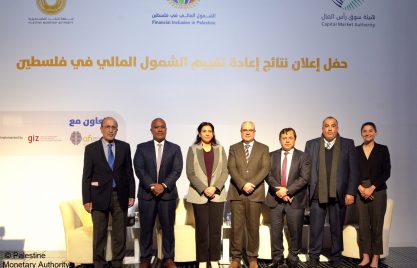Microfinance institutions, the regulator, other public entities as well as social investors, financial institutions and technical supporters discussed achievements, role and challenges of microfinance in Palestine, and ways to ensure continuation and further outreach.
H.E. Azzam Shawwa, Governor of the Palestine Monetary Authority (PMA), described this day as a historical milestone underlining the importance to raise awareness on the positive performance of the Palestinian microfinance sector. Reaching 87,000 clients directly in most challenging circumstances, and providing financing opportunities in all corners of Palestine, is a remarkable achievement at the end of a six-year consolidation and reform phase. Confirming the outstanding relevance of the microfinance sector for employment and growth, Mr. Peter Beerwerth, Head of the Representative Office of Germany in Ramallah, hereby also emphasized the role of the regulator, which facilitates performance and further resilience of the sector.
Enriched by latest data and expert opinions about the Palestinian microfinance sector presented by IFC’s Matthew Leonard, the first panel allowed for a deep look into the visions for the next phase to come: Dr. Riyad Abu Shehadeh, PMA’s Assistant Governor for Financial Stability and Supervisor of Banks, explained the role of the regulator in an interplay of stability and financial inclusion objectives. PMA’s vision is to ensure a smooth yet prudent growth and professionalization corridor for Palestinian MFIs. Looking ahead, Mr. Alaa Sisalem, General Manager of VITAS and Deputy Chairman of Sharakeh, highlighted highest commitment to the missions and next actions of MFIs in order to qualify for offering deeper and broader financial products. Mr. Khaled Qutob, Senior Investment Officer at IFC, described the social investor’s perspective, appreciating a high degree of professionalism in the sector, as well as the clear set of rules that has been set. With a look at the costs of business, Mrs. Lubna Katbeh, Attorney & Managing Partner At Equity Legal Group, added a judgement concerning the current, in parts unique, VAT and salary taxation regime, which adds an additional burden on the clients in the end.
The second panel discussion of the day focused on the results of the paper “Socio-economic Outcome management of microfinance services” by Microfinanza Rating, a study with a focus on social performance of MFIs. In the discussion, Asala’s CEO Reem Abbushi pointed out that under the current framework conditions, fulfilling the social mission and financial targets at the same time means to unavoidably compromise on original missions – without losing them out of sight. Marco Azzalini, representing the Italian cooperation, pointed out on social performance envisioning it as a tool to measure the impact of MFIs, as well as its strength to monitor institutions regarding their mission. Measuring impact in concrete terms and monitoring outcomes over time will be a decisive cornerstone of the next phase of the Palestinian microfinance sector development, as the panelists concluded.
By Thomas Rahn



